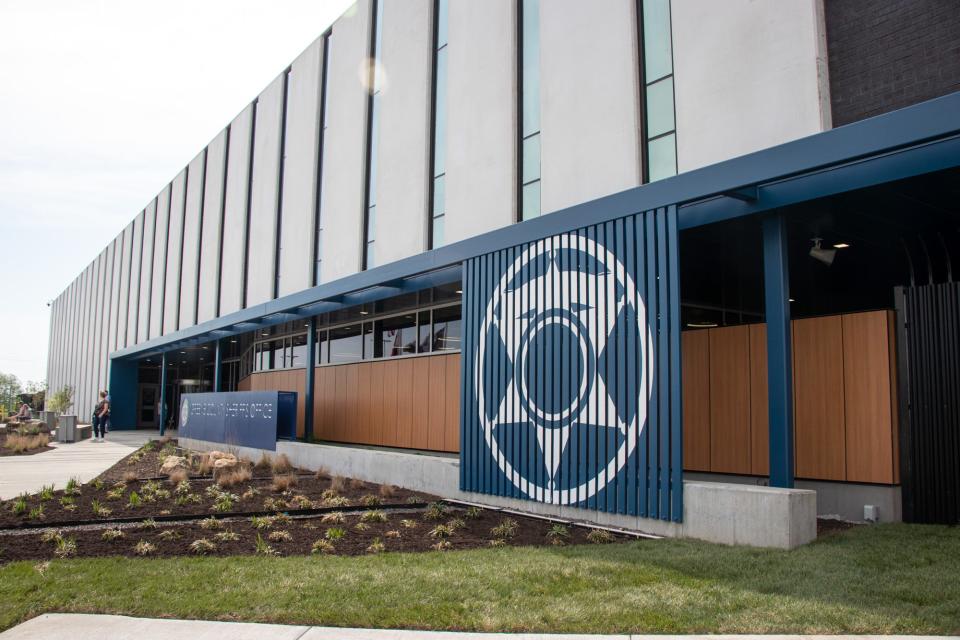
New law, state funding bring mental health treatment into jails, including Greene County
Greene County’s jail is set to become one of five in the state to offer mental health treatment to inmates who need to be restored to competency before standing trial, part of an attempt by the state to address the need for services quickly and efficiently.
When suspects arrive at jail and await trial, they may be ordered by the court to be evaluated for mental health competency. Those deemed to be incompetent to stand trial often are ordered to receive competency restoration treatment. Previously, the only option for this treatment was to go to a state hospital to receive inpatient mental health treatment. With a recent surge in people who were determined to need the services in order to proceed with their criminal cases, the limited number of available beds left many waiting in jail for months.
As of Sept. 28, there were 35 inmates at the Greene County Jail awaiting an inpatient bed to receive competency restoration services. Statewide, there were 253 individuals awaiting admission into state hospitals and 57 waiting to be added to that list as of Sept. 14. At the same time, there were 267 evaluations requested, with about 50% estimated to be found incompetent, according to a presentation to the state’s Mental Health Commission.
This summer, the Missouri legislature amended statute to allow mental health restoration services to be provided within county jails and out in the community. With the new law, the state allocated $2.5 million to establish jail-based restoration programs across five counties, including Greene.
Jeanette Simmons is the deputy director for the Missouri Division of Behavioral Health. She said the program was based on similar programs in other states that have faced the same problem.
“We have more individuals needing competency restoration services than we have inpatient hospital beds,” Simmons said. “This is not just a Missouri issue; this is a nationwide phenomenon.”
The program aims to solve this by easing the demand for inpatient beds while cutting down wait times for people to get treatment.
Sheriff’s office questions use of resources but state says moving ahead
Although state authorities said work to implement the program in Greene County is moving ahead, the sheriff’s office expressed doubts.
Deputy Paige Rippee, public information officer for the Greene County Sheriff’s Office and the jail, said that while many inmates have been waiting for treatment for several months, the program would not be the most efficient use of the jail’s resources.
Rippee said in order to create space for treatment, the jail would have to shut down one to two units. The inmates who would be housed there for treatment would not fill the units to full capacity, she said, which would mean the space is not used in the most cost-effective or efficient way.
“It is something we have looked into, but it’s just not in the cards for us,” she said of the jail-based model.
Debra Walker, spokesperson for the Missouri Department of Mental Health, reiterated however that the state is still moving forward with implementing the program in Greene County and currently working out the details of the contract.
Ironing out the details
The program will operate using the state’s Forensic Mobile Teams, which include nurses, nurse practitioners and social workers. Two staff members from a local community mental health center also will be hired to work at the jail.
The two existing Forensic Mobile Teams were expanded with state funding in the most recent budget. One of these teams was established a couple of years ago. Currently, the teams are serving those needing restoration services in jails across the state regardless of county while they await inpatient treatment.
The jail-based program will also be implemented in Clay County, the City of St. Louis, St. Louis County and Jackson County. Simmons said other counties have already requested to be included if the program expands, though currently the services are limited. She said the counties were selected based on the volume of referrals that come from each jail — no surprise considering that these are the most populated areas of the state.
While an option, the jail-based model will not become the default.
“We don’t anticipate that it will be the answer for every client, but I think individually we can look at it and make those types of assessments and ensure that people are receiving those treatment services while they’re there,” Simmons said. “That’s the intent they would receive the same types of treatment services they would receive in an inpatient setting.”
Stephanie Appleby, the executive director of NAMI Southwest Missouri, said she is grateful the department is putting time, energy and effort into providing more resources, which previously have been very limited.
“I think it’s fabulous and long overdue,” she said of the program. “I hope it works.”
Appleby said she hopes this program and any future efforts can establish a more continuous network of care providers. Creating a playbook on an individual’s care that both law enforcement agencies and mental health professionals can reference to determine best ways to support those needing care is a way to ensure a more sustainable approach to address mental health in the community, she said.
Other treatment options
Outpatient treatment will also be an option for some in need of competency restoration treatment. Simmons said this program would allow people to receive the needed services at their local community mental health centers. Providing this as an option would be a court decision for those demonstrating that they would be successful while free on bond, she said. Individuals held on dangerous felony charges are not eligible.
Rippee, with the sheriff’s office, said there are concerns about this model of service as well. In order for those out on bond to get to these services, they might have to rely on someone else for transportation, along with other potential obstacles.
“Homelessness often goes hand in hand with mental health issues,” she said.
Those who do not have the resources to actually get to their outpatient competency restoration treatment provider or keep on top of their medication may not fully benefit from the program, she said.
More: In the year since 988 went live, here’s what a Springfield mental health provider has seen
Appleby also has concerns about the outpatient portion of the effort. She said inpatient care is generally always a better option, since in order for patients to be successful in outpatient, they “have to really want to live a self-directed life.” Many who find themselves within the criminal justice system are not at that point in their recovery, she said.
But Simmons said the department hopes to work on more ways to connect individuals with treatment before they are within the criminal justice system. Increasing awareness and education of current resources like the 988 suicide and crisis hotline and local behavioral health programs is a large part of this.
“We’ve got to look at getting more upstream to try and help individuals engage in treatment services,” she said.
Marta Mieze covers local government at the News-Leader. Contact her with tips and story ideas at mmieze@news-leader.com.
This article originally appeared on Springfield News-Leader: Missouri plans new mental health restoration program at county jails





